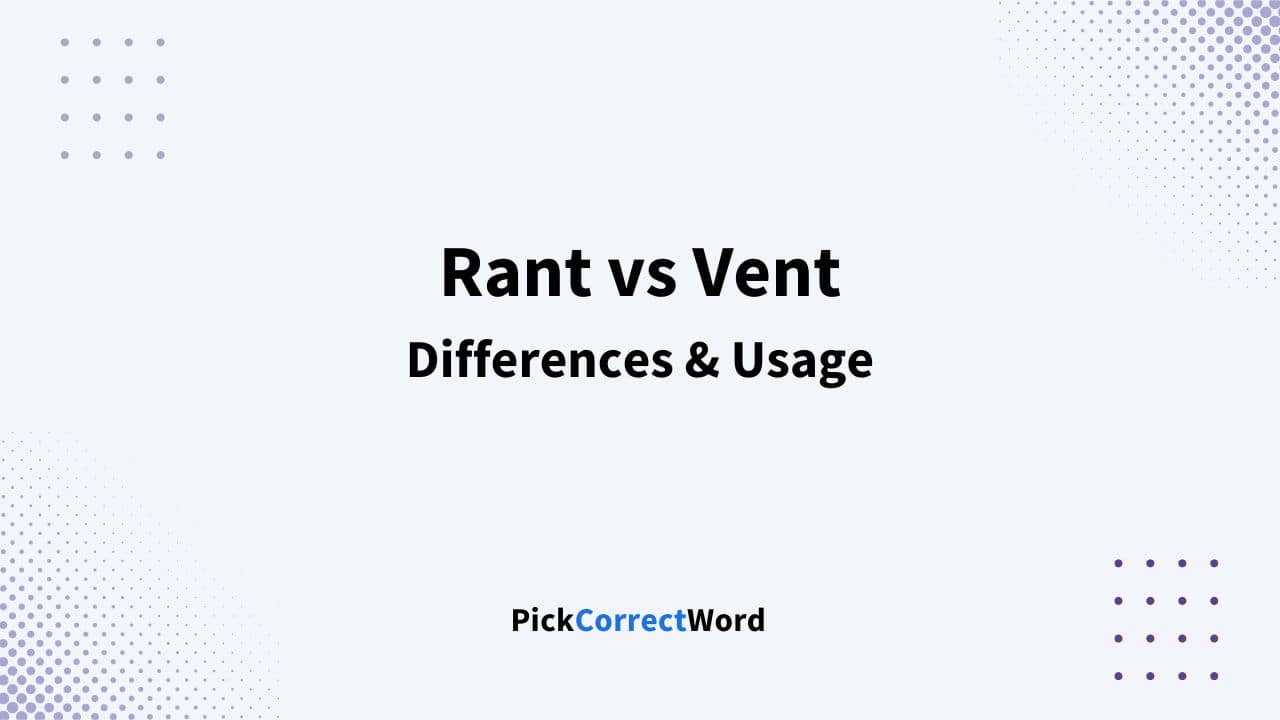Ever wondered when to use rant vs vent? While these two words may seem alike, there’s a tiny difference between them.
When you ‘rant’, you’re expressing your anger in a loud and uncontrolled manner, often about something specific. This can sometimes come off as negative.
However, when you ‘vent’, you’re discussing your frustrations with someone you trust to help you feel less stressed. This is usually seen as a healthier way to share your feelings.
Both words are correct; it’s just about knowing which one to use and when.
Rant vs Vent: What Is The Difference?
A “rant” is a long, passionate, and often loud speech where you express frustration or anger whereas “venting” is more about releasing suppressed emotions in a calmer, more controlled manner.
When you rant, your words can come out strong, loud, and sometimes even rude. It’s often used to get people’s attention or provoke a response.
Venting is about letting out your feelings in a more calm and controlled way. It’s a safer and healthier way to share your feelings without causing the kind of upset that a rant might.
Examples:
- “After a stressful day at work, he went on a rant about his boss.”
- “After a tough day, he found it helpful to vent in his journal.”
Can Rant and Vent be Used Interchangeably?
“Rant” and “vent” might seem similar because they both deal with showing emotions, but they’re not really the same.
When you rant, you’re usually loud and passionate, often because you’re angry. It’s more about getting people’s attention or sparking a reaction. But when you vent, you’re more in control. You’re letting out stored-up feelings in a calmer way, usually to feel better.
Rant: Meaning And Usage
A rant is like a heated monologue you deliver when you’re really upset. It usually stems from feelings of frustration, anger, or unhappiness. You feel the urge to voice your feelings loudly and angrily for a prolonged period.
Unlike a calm conversation or a balanced debate, a rant often feels like a one-sided outburst. You’re not really seeking a dialogue or feedback from others; it’s more about having a platform to release your pent-up emotions.
Example: “She started her day by reading a rant on social media about climate change.”
Vent: Meaning And Usage
When you vent, it’s not just about discussing what’s troubling you. It’s about releasing your feelings and finding some relief from the emotional weight you’ve been bearing.
Venting, unlike ranting which tends to be loud and harsh, is usually more quiet and thoughtful. You can express your emotions to someone else in a controlled and beneficial manner. This prevents those feelings from overwhelming you and can lead to a sense of relief—it can make you feel lighter and less weighed down.
Example:“They met for coffee so she could vent about her recent break-up.”
Examples of Using “Rant” in a Sentence
“His act was one big angry rant against the world.“
“As the boss began to rant, I stood up and went out.“
“She went on a rant about the unfairness of the situation.“
“His social media is full of political rants.“
“During dinner, he started a rant about his day at work.“
Examples of using “Vent” in a sentence
“He used his journal to vent his frustrations.“
“She needs to vent about her difficult day at work.“
“You shouldn’t vent your frustrations on others.“
“He’s just venting, let him speak.“
“She uses exercise to vent her stress.“


